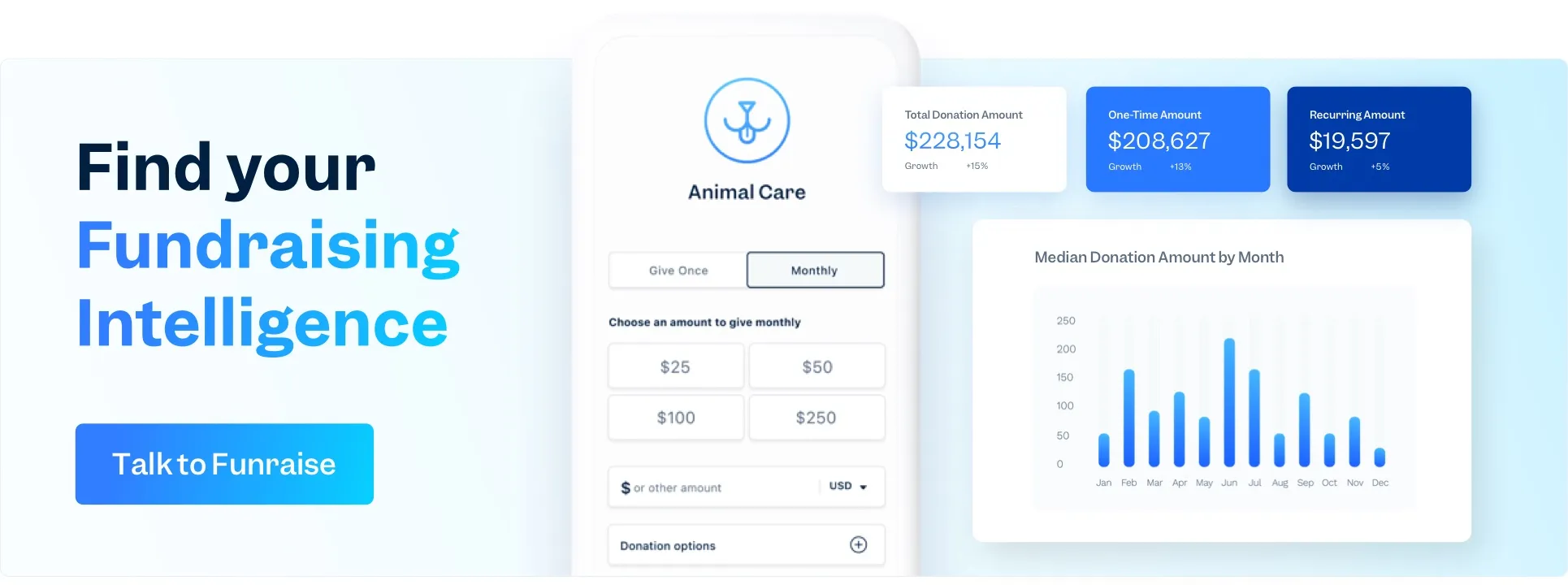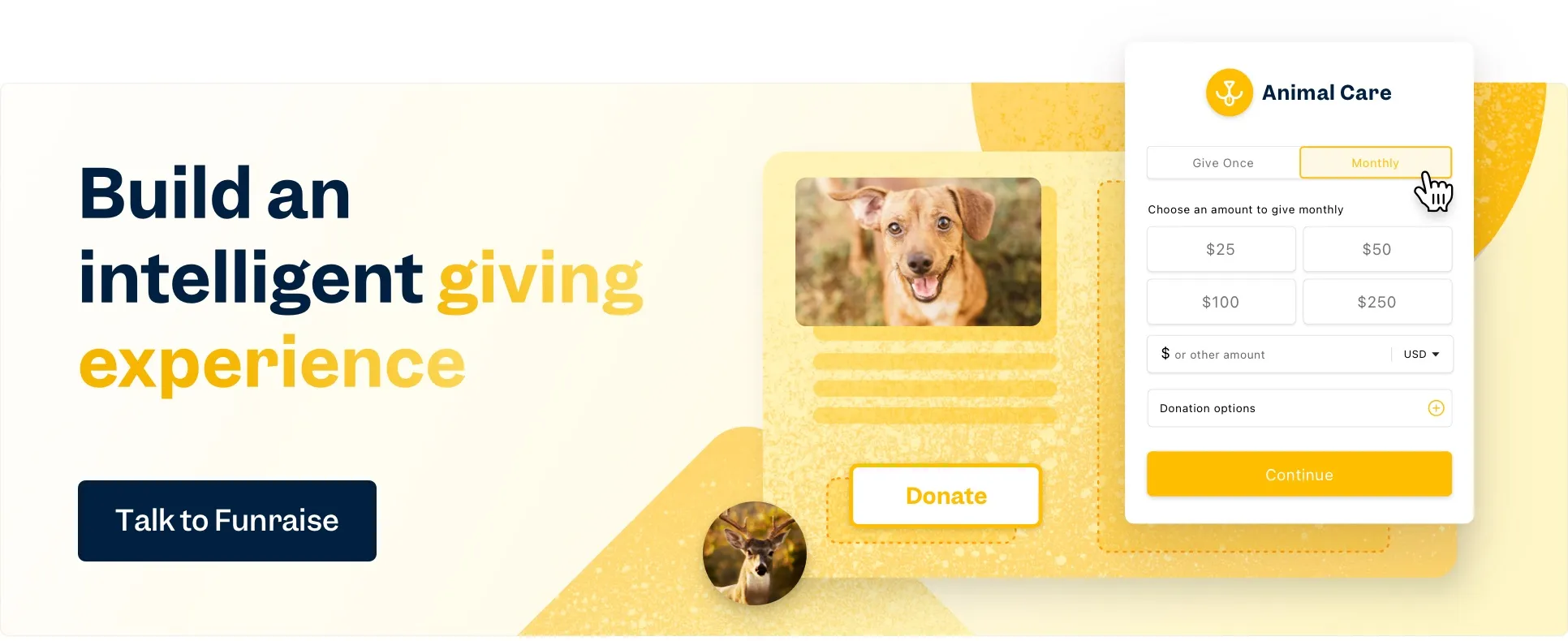Let us set the scene: It's 2021, and in addition to COVID, America is reckoning with The Great Resignation and The Great Awokening. A rapidly-growing startup with big-picture visionary founders, Funraise is preparing to invest significant resources into expanding the world-class team that has already brought the industry's most innovative software to the nonprofit sector.
But instead of just tackling the hiring process ourselves, we asked ourselves, "Is this how we'd move forward with any other expanding program?" And of course, the answer was negative; for any other program or product—paid advertising or a new website or building awesome software—we would take a step back, evaluate the return on our prior actions, search for ways to maximize the program's return, and set a course to realize broadened expectations.
Why should building a team be any different?
And with that in mind, we set out to change the way we hire—and pretty quickly (like immediately) realized this was a job for a professional recruiter.
Cut to 2022: Funraise has implemented a #humanehiring protocol, hired 15+ people with dozens more incoming, opened an office in Poland, and is receiving rave reviews from literally every candidate in the pipeline. Existing and incoming staff are collaborating faster than ever before, and company culture is moving in a positive direction. As a result, revenue is jumping up.
If you don't have time to listen to the podcast, check out our summary below, with all the kicky deets you need to infuse your nonprofit's hiring process with equity, transparency, and a great candidate experience. (And please do note that this is a summary, so we've taken liberties to shorten and clarify the convo between Justin and Angela—lucky you, because this is a loooong-but-worth-it article.)
Justin Wheeler:
Angela is our internal recruiter, which means she is involved with candidates at the very beginning of their journey here at Funraise. We hired Angela at the beginning of 2022, as we knew we were getting ready to ramp up our own headcount, and today, we want to talk about a concept called humane hiring—something that Angela brought up quite a bit during the interview process, and something that we have been stumbling through, hopefully gracefully, as we've been implementing our own new humane hiring practices. Angela, tell us a little about yourself, your background, and what you do here at Funraise.
Angela Manginelli:
My name is Angela Manginelli. Pronouns are she, her, hers. Prior to coming to Funraise, I was working in higher education, specifically in international education and career development, kind of on the other side of the process working with students when they came back from studying abroad. I helped them take the transformative experience they had had, put it on paper, talk about it in interviews, and things like that. I also had the opportunity to, with colleagues, start (and unfortunately a decade later closed down) my own nonprofit, which is sort of what led me to Funraise.
When I learned about Funraise as a tool and as a company, I was really excited because it would have been a game changer had I known about it a decade ago or, you know, many years ago. And for me, it was what I love about my job—having an opportunity to kind of change things on the other side of the hiring process.
Justin
Since you've been on board at Funraise, it's been really interesting, not just to get their [candidates'] feedback about the process they went through to get a job to Funraise, but also even candidates that were turned away who maybe didn't meet the qualifications that we were looking for—we even hear positive feedback from them about their experience. And that is 100% due to your commitment and effort to a humane hiring process.
The reason why we're talking about this today is because there are a lot of open job positions in the nonprofit industry. And I think often what we see is you don't see strong human resources. You don't see strong recruiting efforts at the nonprofit level. And so I want to talk to you about this because we see this as a big opportunity for organizations to stand out with a still a very competitive candidate pool. So all that said, what is humane hiring and why is it important?
Angela
To me, humane hiring is a shift away from treating people like a number.
We know that on average, pre-pandemic, there were 250 applicants for every position that was posted. That's a lot of people! And we hear these nightmare stories of candidates applying and they're like, "We never hear back."
I think we have a really unhealthy way of approaching hiring just sort of nationally and globally. And to me, humane hiring is an opportunity to really keep the candidate and their experience at the forefront. Making sure that we are being really thoughtful doesn't cost money, right? It's merely communicating with candidates, letting them know what is going to be expected of them as they navigate the interview and hiring process. Just being really as clear and transparent with them at the beginning as possible.
In my mind, greater transparency equals a positive candidate experience. I've had countless candidates that have said, "I can't believe how transparent you were in your job description. You know, you're sort of laying everything out for me." And speaking to what you mentioned earlier, as far as candidates that go through the entire hiring process and then don't get a job offer, they're still sending us really positive feedback, "I'm really glad that I went through this process. I've learned so much and I'm going to be a stronger candidate in the future because I've gone through this process." So to me, humane hiring is doing things differently and more humanely.
Justin
So on the transparency side, what's the difference between a transparent experience and a non-transparent experience? What do you mean by transparency and how can organizations take it up a notch?
Angela
That's a great question. For us at Funraise, transparency does begin in the job description—we give the salary expectation. That to me is such a small thing, but it's so important not only from an equity standpoint in making sure that candidates are being paid fairly, but also just knowing, "Is this a process that I want to engage in? Is it worth my time?"
So just making sure that you're giving salary transparency, talking to them about what the interview process is: "Okay, you're going to submit the application, then you're going to hear from the recruiter. You're going to be invited to a phone screening. From there, you know, there's two more interviews."
One of the things that I appreciate that we've done at Funraise is we've capped our interviews at three. That is the most interviews you're going to go through. That's two and a half hours of time, right? That's still a significant commitment. But I've talked with a lot of candidates and they're like, "I've gone through 10 interviews." You're not talking about being the president, you know what I mean? Like, what we are putting candidates through is ridiculous in a lot of cases.
So I think that just those two small things: adding what you're going to be paying and what the process will look like is a small but important step. Going beyond that, we have 30, 60, 90-day expectations for each role, as well as how a new hire will continue to be evaluated in that role. We're letting them know in advance. We have a really a beautiful career development program that was was here before I got here that ties directly into the job description, ties directly to how they're going to be reviewed and how they're going to receive salary increases and things like that as they go. So there's a really intentional throughline through the process.
Justin
For the executives listening, something I hear quite often is specifically around transparency with compensation on the job hosting itself. You know, the concern executives have is,"The people on my team that have the similar positions that were here two or three years ago, they're actually not making as much as we're posting these new positions because the market has changed."
And so, just from one executive to the next, you know, that was a real challenge we had and we've had to do true-ups. And we've had to make it right with team members who hold the same titles, and the market has shifted. I mean, in many, many cases it has shifted overnight with inflation and so forth.
And so, yes, this is part of what I mean when we stumbled through it; it's we post the positions, didn't think necessarily through how this could impact existing team members and... we've had to right size and make that adjustment.
You know, the lesson learned there is: It shouldn't take posting a job with a salary request to right-size your employees. It really should be something that we do more consistently on an ongoing basis, right. And so I think that the idea of posting comp on a job description is only radical if we're not taking care of our employees to begin with.
If we're taking care of our employees, it's not so radical and it's not going to cause problems. And so I think that's an important step for sure in recognizing and also as a challenge. And the thing I want to communicate to you is that this can be incremental. You can make incremental steps to become a more humane hiring team. Certainly, that's what we've done. Again, we haven't gotten it right every time. We're still going through the process.
Okay, moving on from "What is humane hiring?" and onto the why behind it. Why should organizations care about putting their candidates through a humane process?
Angela
That's a great question, and I think it actually kind of goes back to what you were just saying as far as having to do evaluations about pay and making sure that you're being really thoughtful about that.
The hiring process is the beginning of the long term relationship with the candidate who becomes the new hire, who, long term, you want to have tenure at your organization. Humane hiring starts the relationship in a positive way and I've had so many candidates that have said, "If you're this transparent from your job description and from your hiring process, I can only imagine what a joy it's going to be to work at the organization."
So you're creating this really good foundation that's going to help retain employees. I mean, there's all sorts of data about how, when employees leave, it costs thousands of dollars to replace them. So the goal not only for me as a recruiter, but for you, as you know, the CEO and a Co-founder, is to want to keep good talent when you have it. And humane hiring allows you to do that.
You're creating trust in this relationship with the candidate that is going to continue for their entire employee lifecycle. And that's really important. Yes, it's the right thing to do. Yes, there's all sorts of reasons that are small and speak to the individual. But like, bottom line, this is going to positively impact your bottom line. It's going to keep talent with you. It shows your employees that you care about them and that you're being really intentional in how you treat them in the entire process. And I think that's super important.
You know, one in four people left their previous roles in 2021. That wasn't a coincidence; it was because people want to be supported and trusted and appreciated and compensated. If you do that as a company, that's more than half the battle, right? You're keeping people there. And it starts from the beginning with how you treat them in the interview process.
If you treat them poorly, it's not going to get any better when they're working for you. But if you treat them fairly from the beginning, they're going to trust you and they're going to be willing to go on a journey with you. And I think part of that, too, is in the interview process, admitting where you are, like we talk with candidates about, we're a tech startup and things will change, but we're going to communicate with you. And candidates really appreciate our transparency and our honesty about that.
Then it's up to them to make the decision, "Hey, is this going to suit where I want to be in the next chapter or not?" But again, we're sort of playing the short and the long game, right? We may not bring someone on now or they may say, "This is not where I am right now in my career." But that doesn't mean that we're not starting a positive relationship that we'll be able to maintain in the future. And hopefully, there will be an opportunity in the future for them to join our team.
Justin
Absolutely. When you think about the experience that you can provide a candidate and how that foreshadows what their experience is going to be like as an employee of the organization. You go back to your first example of an individual you spoke with that was like on their 10th interview and didn't know what was next and didn't even maybe even have a sense of whether or not they were going to get hired. At that point, that almost is like that person should be compensated for their time if you're really taking up 10 interviews.
You know, you can get a sense for how your employer is going to treat you as early as your experience in the interview process. That's something I didn't appreciate until we brought you on the team and your commitment to this process.
Another couple of questions here. So what are some things that organizations can do to be more humane in their hiring? Any tips? ...I know we talked about transparency in the job description and so forth, but anything else that you think is worth mentioning to help organizations understand what this looks like?
Angela
Well, I think something that I appreciated that Funraise was doing before I got here was sending out the questions for the interviews. Work is very rarely a pop quiz, right? And knowing that interviewing is inherently stressful for everybody involved, like, why can't we make that just a little bit easier? And that was something, for me as a candidate, it gave me faith that Funraise was going to be at a point to move even more humanely in their hiring process. Because you were already doing it.
So, sending out questions to candidates really speaks to running a structured interview. You should be asking every single candidate for the role the same questions in the same order. And obviously, they're going to bring up things and you can ask follow-up questions.
And that was certainly something that we, you know, when we talk about like stumbling, that was something we had to figure out organizationally. Is it okay for us to ask follow-up questions? Yeah. If the candidate is bringing something up in the interview, absolutely. But I think just making sure that you are giving each candidate the opportunity to showcase their talents, their abilities—and the best way to do that is to ask every question in the same order, right?
Also, we let them know from the very beginning: "You are encouraged to negotiate your offer, when an offer, if an offer is made." Top talent negotiates. We know that. It is a conversation. So that's something I just tell candidates at the top.
We actually have a 10-minute video. It's not a Scorsese sort of thing, but it's like, it's me sitting at my desk saying, "With my background in career development, I want you to be successful. And here are some tips to being successful."
Much like staff may not have had experience with interviewing in the past, I think we in being humane can provide tools and say, "If you want to be the most successful in your application to this organization, here is what we encourage you to do for us." For our Account Executive role, for example, we do a role play. And so in the video that I've made for candidates, I just sort of talk, I walk them through, here's what our sales cycle looks like. Here is what the interview format is going to look like. And we've had so much positive feedback from candidates.
Now, granted, part of this is in the candidate's court. Like, you can give them all the tools and they may still not prepare. I recognize candidates are likely navigating multiple interviews with multiple companies. That's understood. But we are giving them every tool that we can to make sure that they're successful. And I think that is what we're doing differently and what I would love to see more companies doing.
Having information on your website about, you know, "Here is our ethos when it comes to hiring." That's something that's a work in progress for us as well.
I also think that surveying candidates after the experience, whether they get the job or not, is really important. This is an iterative process. As you mentioned, we don't have it all figured out, but we are committed to constantly evaluating it and constantly making sure that we are keeping candidates top of mind in the interview process.
So, one of the things we're going to be doing before the end of the summer is surveying all of the candidates that I've been working with since the end of February and getting feedback from them whether they got the job or not and saying, "Was this process humane for you and what could we be doing better?" And then we can take that feedback and put it into play in the future.
Outside of that, I think just really also communicating with candidates. We let candidates know within seven business days whether they are moving forward in the process or not. And we use an ATS, an applicant tracking system, so we can very easily see what date the candidate applied and where they are in the process.
We have notifications if they're reaching that seven business day mark so that we can make sure we communicate with them. Candidates understand if you need more time; for example, as you're wrapping up interviews, they want to be hearing from you and knowing that you haven't forgotten them. There are nightmares—I joke that I applied to a university years ago and I'm still waiting to hear back if I got the job. Like, it's it's one of those things... it costs nothing to send an email and to let candidates know where you are in the process. And so I think just communicating and being transparent and really thinking about what sort of process would you want to go through if you were a candidate at your own company.
Justin
That's super helpful. And I think one of the items that you mentioned that's really hard in practice is the feedback for candidates that ask, you know, why they didn't advance to the next phase or why they didn't end up getting the job. A lot of organizations just kind of shy away from that for liability reasons.
But it's very practical and when you've committed to humane hiring from the beginning with a candidate, that part of closing the loop is incredibly important, and it can be done in a way where there's not liability. I don't think that this is something companies really need to need to be worried about if they do it and they approach it correctly, because, again, we hear lots of feedback from candidates.
And who knows? If they come back and apply at Funraise, maybe it prepares them more for the different positions that we have. What are some lessons you learned in implementing humane hiring here at Funraise? We'd love to share some of those lessons with our listeners.
Angela
Good question. I think remembering that you can take baby steps.
I'm one of those people that I'm thinking about the short game and the long game all of the time; I'm very strategic. So I'm like, okay, I've got this big idea for what I want to do and let's implement it immediately. I recognize I came in very quickly and was like, I have some ideas and we were able to implement a lot of them.
But I think one of the things I recognized is change is scary. And so being really mindful about making sure that you're having those conversations. And really getting buy-in from everyone that's in the hiring process, getting them to understand this is actually not very different from what you were doing already.
And it's not restrictive. Especially with the structured interview process, making sure that the hiring managers understand that you're still going to be able to get the answers that you need to make the hire. But we're going to do this in a way that is is leveling the playing field for all candidates.
And I think just remembering that it is an iterative process. We're a work in progress, right? So we're constantly going to be making adjustments. And it's really important from my side, as the one driving the bus, I need to be flexible and I need to also be able to meet hiring managers where they are. Like, I'm keeping the candidate experience at the top of mind, but I also have to make sure that I'm being collaborative with hiring managers and making sure that they're comfortable.
As much as possible, doing training—being an interviewer is not something that comes natural. It's not something that we do in our daily life oftentimes. And so if you have staff that have never interviewed before, it's really important to make sure that you're doing some training so that you can manage expectations and align across the team. These are the questions we're going to be asking. Here are follow-up questions that build from each round of interviews.
We're human. We're going to make mistakes. And we learn from those mistakes. And we make it better in the future. You know, we don't expect perfection. We just want progress. And I think that's really important to remember just in general as well.
Justin
Yeah, absolutely. You know, something that I remember earlier on in the process in rolling this out, like one of the more challenging aspects of it, at least internally for us, was around the rubric of what makes a good answer.
Part of the process internally is when you create your interview questions, you create as well, what makes a good response to these questions... which is why I'm a big fan of getting candidates these questions ahead of time so they can think through it! Because, like you said, very rarely in the job place do you have to make like a knee-jerk decision without actually thinking it through or consulting somebody else on the team? Most decisions are made within teams, not at an individual do-or-die sort of situation.
That's why I'm a big fan of getting questions out, but then for for the interviewers to actually be thinking, "Well, what do I want to hear? What makes like a really good response?" One of the things we talked about early on was this also helps remove implicit bias that we may have as interviewers.
And so I do remember this was a challenging point because as we're rolling out and as we're hearing candidates responses, we realized that it's a little bit more fluid than this. How do we iterate on top of the rubric? How do we iterate to ensure that we're like, you know, really thinking through the response correctly? But I think we have sent out a really great sort of rhythm there and it's become important, a very important part of our process.
Angela
And the thing is, and I fully recognize, it is a time commitment at the beginning to put together what we internally call our hiring blueprint. The hiring blueprint is really where we look at each round of interviewing and we decide, okay, "Here are the questions that I'm going to ask in the recruiter call. And this is what the hiring manager is going to ask in the second round. And then, you know, if there is a third round, here's what we're going to ask."
Those interview questions should all tie back to the job description, which again takes time. Right. You've got to look at your job description and kind of make sure that the things that are in there speak to how a candidate will be evaluated when they're in the role. And then we want to make sure that, the interview questions—really everything should directly point back to the job itself.
You know you hear stories of different companies asking, you know, what kind of animal would you want to be and why? Like, really do you need to know that? Is that important for them being an Account Executive, probably not, right? I am a fan of just making sure that we're being really thoughtful with the questions that we're asking and we're not wasting a candidate's time or causing undue stress in that regard.
So it is a time commitment at the top, just making sure that the hiring manager, especially, understands that the more thorough they are there, the quicker we can actually move when we get into the hiring process itself. And so you spend some time at the top and you get it back at the end, basically.
Justin
Absolutely. So I want to take a minute here before the next two questions just to share a little bit more with our listeners, why we're having this conversation. At the top of the interview, you and I talked about the fact that there's a ton of open job opportunities in the market today. Lots of candidates are looking for their next career move.
So Funraise, we work with thousands of nonprofits, got tens of thousands of users. We've got 100,000 plus people subscribed to our newsletter. We care deeply about this industry. We always have and always will. And one of the opportunities we see in the market as a company that's continuing to invest in the nonprofit industry is the opportunity to really promote and to bring a wider audience to these job postings and these job listings.
We've seen this and have heard from many of our customers that it's such a pain point for them to find good candidates or to promote their positions without having the right sort of budget to do so. And because we believe we're uniquely positioned to bring a lot of eyeballs to the positions that you're posting about, we are launching something very soon that will be promoting your job postings, whether you're a Funraise customer or not. The only criteria for your posting to be listed and for us to promote it is that it has to be part of the humane hiring movement.
And so, Angela, what advice would you give or how can organizations take steps today to be a part of the humane hiring movement?
Angela
Well, one, I'm really excited already. I mean, again, I've been here four months and the fact that this is already becoming like a much bigger movement than just Funraise is really exciting. I think for nonprofits that want to join us, it's really just making a decision to do it right. Like your candidates are going to thank you. Your hiring managers are going to thank you.
Really look at your hiring process right now: what are you doing that candidates love and what can you be doing better? Are you being as transparent as possible? Are you putting them through 10 rounds of interviews or can you join us in just sticking to three?
Can you join us in that space making sure that you have salary and interview process transparency in your job description? That's a baseline, right? If you do nothing else, that's going to be more equitable and be more enjoyable and humane for candidates. But then just again, keep in mind that you want to have everyone on board, so start having these conversations as a staff with anyone that's hiring and really help them to understand and buy into the benefit of humane hiring in general. I think that is the first step.
Justin
Awesome. Well, thank you. And then lastly, I'm always interested in people's personal motivation. This is something that you've really spearheaded here at Funraise and have really changed our culture for the better. What's what is your motivation and what's your long-term thinking and goals around humane hiring?
Angela
I love that question. Again, for me, prior to coming to Funraise, I was on the other side of the process, working with college students and recent grads, and I was hearing all of these stories and hearing all of their anxiety and stress about interviewing. That is what made me want to be a recruiter. It's what made me want to join Funraise and really be able to help change a system and a process that has been broken for a very long time. Change takes time. But again, it's so exciting to see that [Funraise] is all in with it and then also encouraging other folks, nonprofits and others in the tech industry to do that.
My long-term goal is world domination when it comes to hiring. Like, I want every organization to be humane in their hiring; that is my long-term goal. Now it's going to take a minute to get there, but I think it's a ripple effect, right? If we're doing it and we can encourage other nonprofits to do it and to join us, there's safety in numbers and there's power in numbers.
So once we have nonprofit organizations that are working with us, there's going to be pressure on other organizations. Hey, if they're doing it over in this sector, in this field and industry, why aren't you? Great question. And it's a candidate's market right now. So if you're not treating a candidate fairly and humanely, they're not going to stay with you. They're not going to go through your process.
So for me, it's really just thinking about how can we encourage more organizations to be doing what is best for candidates and, ultimately, then best for us as an organization?
How, indeed. We couldn't have said it better ourselves, Angela. Thank you for bringing humane hiring to the forefront at Funraise—we can't wait to see the movement grow.































.webp)
.webp)











.webp)
.webp)

.webp)
.webp)
.webp)




